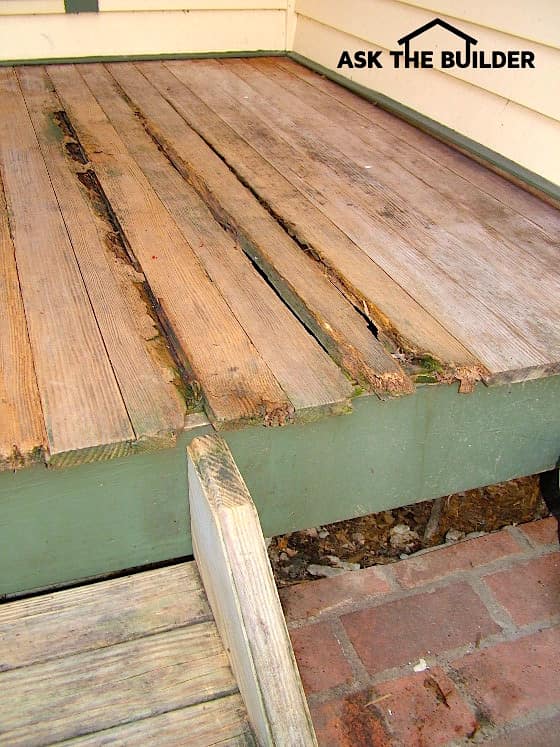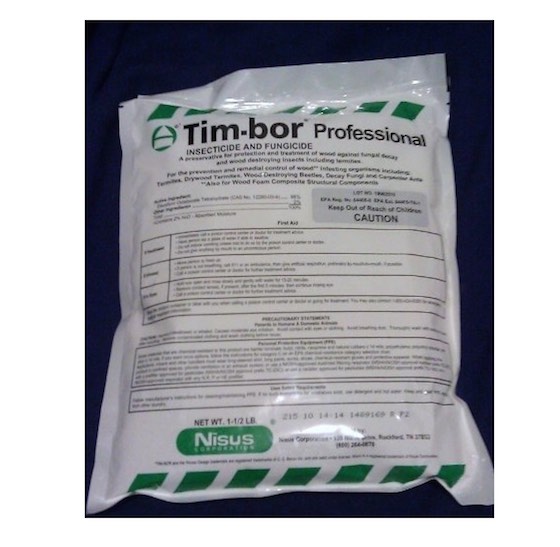About Borate Chemicals

Borate wood treatment would have prevented this wood rot. This tongue and groove porch flooring is exposed to the weather. It suffered serious wood rot because it was not treated with a borate preservative. ©2018 Tim Carter
"The borate chemicals are a diffusible preservative. This means they can actually - and do - penetrate wood cell walls."
Borate Wood Treatment - An Effective DIY Wood Rot Trick
Related Links
Borate Chemicals for Wood Preservation
Termites - Soak Wood with Safe Borates
Free & Fast Bids
CLICK HERE to get FREE & FAST BIDS from local pest control companies that use safe borate chemicals.
What is Borate Wood Treatment?
Boron is the primary ingredient in the borate wood treatment. The fancy chemical name is disodium octaborate tetrahydrate.
It's found in glass fiber insulation, glass wool, high-temperature glass, enamels, detergents (remember the mule team stuff!), ceramics, flame retardants, magnets, fertilizers, and wood preservatives. It's also found in pesticides.

This is borate wood treatment. It's a powder you mix with water. CLICK THE PHOTO now to have it delivered to your home in two days.
Is Boron Mined in the USA?
A major boron mine has been located in the United States since the 1800's. It's in California.
The positive properties of boron and borate wood treatments have been known for some time, it just has never caught on.
Is Borate Wood Treatment Water Soluble?
The primary drawback is that the borate chemicals are water soluble. This means you dissolve it in water and use the water as the transport vehicle to get it into the wood.
This also means that water can extract the protection! Thus, if you pre-treat wood with borate chemicals at a factory and they get wet, there may be a loss of protection. Get the wood really wet, and the borates can completely leave the wood.
Are Treated Lumber Chemicals Water Soluble?
The old CCA (chromated copper arsenic), modern alkaline copper quaternary (ACQ), and LSOP (light organic solvent preservatives - i.e. creosote) methods of treating lumber are more popular because these chemicals are not water soluble.
This is why the CCA lumber - when it first came out - had a lifetime warranty. I clearly remember that back in the mid- 1970s.
CLICK HERE to get FREE & FAST BIDS from local pest control companies that use safe borate chemicals.
What are the Advantages of Borate Wood Treatment?
The borate wood treatment chemicals you can use to treat lumber are really wonderful. I wish I had known about them when I built my home! They protect wood against a broad range of insects and fungi - wood rot!
They have a low toxicity level with mammals.
The borates can disperse readily in wood. If the wood is kept dry after treatment, the borates persist indefinitely.
The wood properties stay the same after treatment. The borates are odorless, have a low volatility, and they don't corrode iron, galvanized metal or aluminum. The best part is that they are cost effective.
Does Borate Wood Treatment Stop Insects?
The borates are effective at controlling:
- brown, white and red rots
- powderpost beetles
- furniture beetles
- old house borers
- subterranean termites (Reticulitermes, Coptotermes, Heterotermes)
- damp wood termites
- dry wood termites
- carpenter ants!
- cockroaches
- ants
- silverfish
- earwings
- crickets
The bad news is that they do not deter carpenter bees. Man, do I hate those devils! They have drilled hundreds of holes in my current house!
How Does Borate Wood Treatment Work?
The borate chemicals are a diffusible preservative. This means they can actually - and do - penetrate wood cell walls. Some other common preservatives are called envelope biocides (creosote, CCA, and pentachlorophenol) as they can produce an envelope of protection several inches from the wood surface.
The borates kill fungi and wood rot because they interfere with the enzyme systems in the microorganisms. When wood destroying insects eat wood that contains borates, it is a slow-acting stomach poison.
Worker termites transport wood back to the rest of the colony to eat. As such, the rest of the termites get sick over time, exhibit sluggish behavior, stop feeding and become moribund. In other words, the borate chemicals kick butt and take names!
If you decide to use the chemicals, be sure to follow all safety and handling guidelines!
CLICK HERE to get FREE & FAST BIDS from local pest control companies that use safe borate chemicals.
Column B272


8 Responses to About Borate Chemicals